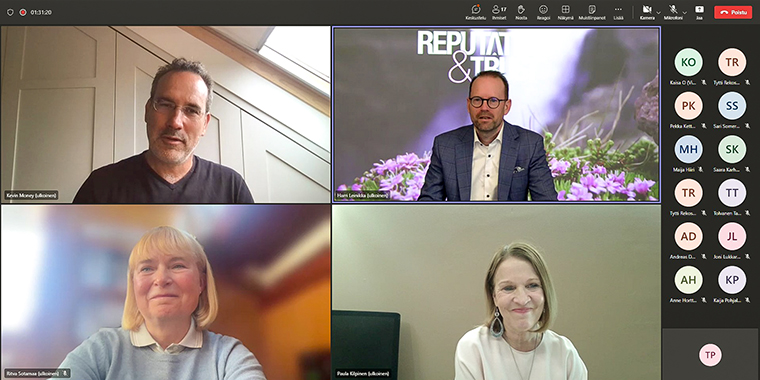
On May 22 DIF and Henley Business School organised a webinar about building reputation and trust in a contested world.
Paula Kilpinen, Henley Business School Finland’s CEO, gave the opening words and shortly presented Henley’s operations and services.
Keynote speeches were held by Henley’s professor Kevin Money and Harri Leinikka, CEO of T-Media.
Professor Money spoke about reputation and how it differs from brand, how reputation can and should be embedded in board decision making, and how board can build reputation in a contested world.
Reputation is a perception of character. It is what others think about you (or your company). Whereas brand can be controlled, bought, and sold, reputation cannot be controlled, it can only be influenced. Brand sets the context for reputation. Therefore, value of brand lies in reputation.
Why is reputation important? It drives value by attracting people, keeping them loyal, and making them more forgiving. Good reputation enhances stakeholder relationships and increases options for example for investments and funding.
Boards are responsible for building reputation with the stakeholders. It is key for the board to understand the stakeholder universe. For measuring and managing reputation, boards can build a corporate dashboard that helps to follow competing stakeholder needs.
In his presentation, Harri Leinikka provided insights from both Finnish and Nordic perspectives, drawing from a vast Reputation & Trust databank. He also discussed strategies for boards to effectively evaluate and mitigate reputational risks.
What are the consequences of a reputational crisis? Loss of reputation can mean for example loss of trust among stakeholders, decreased sales and revenue, higher costs, and decline in market value.
Leinikka also introduced a reputation management maturity model, where on the highest level of maturity reputation’s strategic role is understood on all administrative levels of an organisation, reputational KPIs are considered in management rewarding, the company reports on its reputation to key stakeholders, and reputational perspectives are underlined in operative decision-making.
Closing words were given by Ritva Sotamaa, member of DIF’s board. Sotamaa encouraged to start building reputation rather early than late because it is a long game. It is also better to start when times are good. Then the company is more resilient when a crisis hits.
The webinar recording can be found on the member pages (login required).
